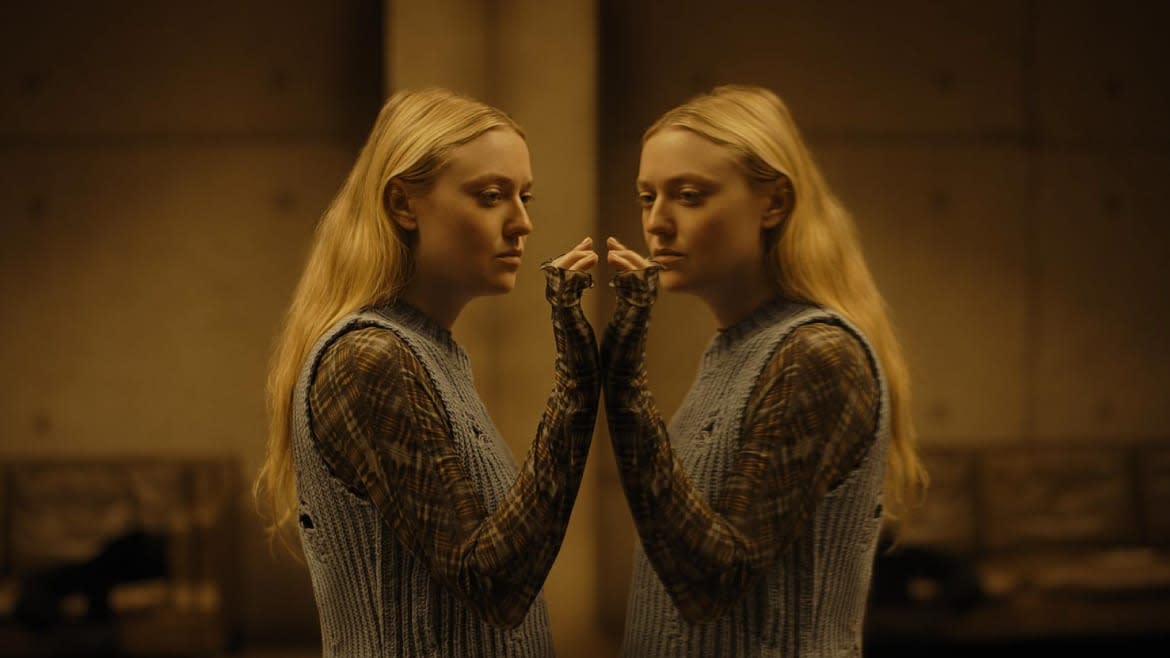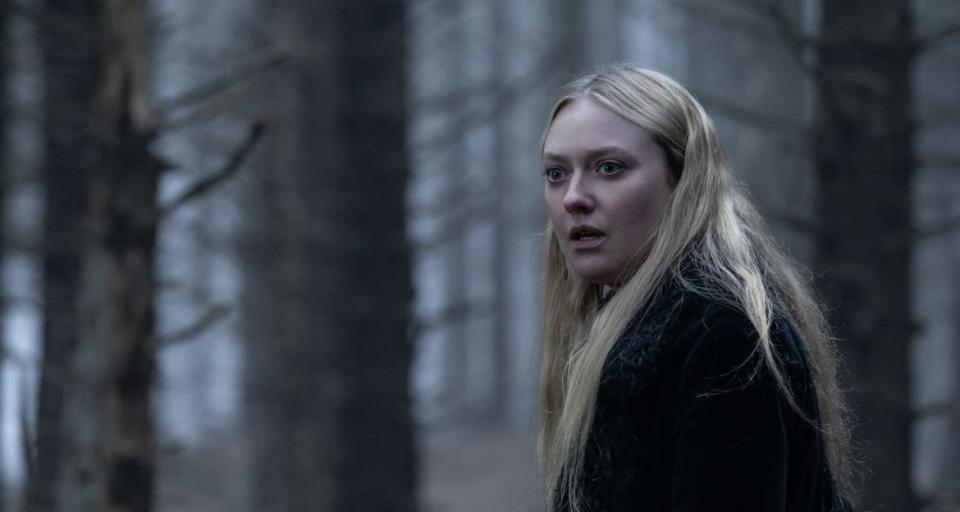Shyamalan’s ‘The Watchers’ Big Twist: Not All Nepo Babies Are Good Directors

The Watchers is a case of like father, like daughter, in that Ishana Night Shyamalan’s directorial debut follows the same basic pattern as the work of her dad, M. Night Shyamalan—namely, it starts strong and then slowly falls apart under the weight of its obligations to clarify its baffling scenario. An adaptation of A. M. Shine’s 2022 novel, the filmmaker’s maiden feature not only suggests a raft of tantalizing early mysteries but establishes a variety of motifs that lend it an intriguing meta texture. By its conclusion, however, it resorts to the type of excessive and clumsy explanation that decimates plausibility and suspense.
As she demonstrated during her tenure on her father’s superb Apple TV+ series Servant, Shyamalan is an expert mood-setter. She puts those skills to excellent use—generating unease through canny framing and sharp sound cues—at the outset of The Watchers, which hits theaters June 7. In a prologue, a man flees through dark, misty woodlands as narration from Mina (Dakota Fanning) reveals that this Irish forest “draws in lost souls” who never escape its clutches. This individual’s grisly fate at the hands of growling unseen beasts proves that point, and after he’s dispatched, the film segues to Galway, where Mina is working at a pet store. When her boss assigns her to transport a yellow parrot to a zoo near Belfast, Mina readily agrees, although she doesn’t depart the city until spending that evening at a bar flirting with men while wearing a dark wig and assuming a phony identity.
Between that pastime, various close-ups of Mina’s eyes and shots of her staring at herself in the mirror, and her comment to her avian pal, “Don’t look at me like that,” The Watchers conveys that Mina doesn’t want to be seen. A message from a sister whose voice sounds identical to her own—and who’s upset that Mina is MIA from the memorial for their mother, who died 15 years ago to the day—reinforces the notion that she’s hiding from everyone, including herself. These undercurrents all become exceedingly relevant once Mina’s GPS guides her into the previously seen forest, her cell phone and radio go on the fritz (flashing strange runes before shutting off), and her car dies.
Stranded in the middle of nowhere, Mina takes her chatty bird—whom she names Darwin, and whose mimicry and color are paralleled by Mina’s childhood conduct and dress—and searches for a way to survive this unexpected nightmare. Instead, the sole thing she discovers on her stroll is that her car has vanished, leaving her up that proverbial creek without a paddle.

Dakota Fanning
Fortunately, as night begins to fall, she spies a figure running through the trees and, giving chase, she comes upon a shed. Barely making it inside before the unholy noises outside threaten to overwhelm her, Mina is introduced to the rest of her new roomies: wiseass Daniel (Oliver Finnegan), friendly Ciara (Georgina Campbell), and sage Madeline (All You Need is Death’s great Olwen Fouéré), the last of whom informs Minda that this abode is known as “The Coop.”
More baffling is news that each night, they all must stand in front of a wall-size two-way mirror so they can be viewed by the forest’s Watchers, a mysterious race of inhuman creatures that roar and rampage when their instructions aren’t followed. As Madeline notes, there are also additional rules to which they must adhere: never turn your back on the Watchers; never open the door at night; never go to the cavernous burrows in the forest; and always stay in the light.
‘Longing’: Richard Gere’s Grief Drama Will Have You Mourning His Career
Since Mina is on the run from her past, her guilt, and her life, she doesn’t love being imprisoned in a remote single-room shack where she’s forced to figuratively act (as herself) for an invisible audience. The Coop’s interior is akin to a stage and its window resembles a giant anamorphic movie screen, and for a time, such self-reflexiveness serves The Watchers well, implying an underlying fascination with voyeurism, performance, and sight.
Concurrently, Shyamalan refuses to beat around the bush, having Mina almost immediately break one of Madeline’s cardinal laws so she can learn more about her circumstances (and the film, in turn, can up the horror insanity). Thanks to Mina finding a 1990s-era camcorder and Daniel’s techno-ingeniousness, this motley crew constructs a de facto surveillance system outside the Coop, thereby thrusting the material headlong into perilous madness.
The Watchers has various secrets to tease and divulge, but it’s considerably more proficient at doing the former than the latter. At a certain stage, the film leaps forward in time and boxes itself into a corner, and it opts to extricate itself from narrative trouble via a twist that—even in this supernatural context—strains credulity. What ensues in its aftermath is a series of revelations that provide information at once enlightening and deadening. Simply put, the initial answers dispensed by Shyamalan’s script are a letdown, and the writer/director compounds that disappointment by indulging in lots of third-act explanations for her earlier ho-hum explanations.

A still from The Watchers
Mythology and lore are referenced, expanded upon, and further revisited to dispiriting degrees, transforming what was an entertainingly spooky puzzle box into a slog about legendary (poor-looking CGI) monsters, their ancient relationship to humanity, and the strict rules that govern their behavior.
The nature of the Watchers remains, throughout, intimately related to Mina’s personal and familial hang-ups, and Fanning—on the heels of her superb work in Netflix’s Ripley—again proves herself a compelling and understated lead. Still, The Watchers can’t sustain its opening momentum, and a climactic showdown that gives way to a coda that mutates into a surprise third finale both distances the film from its most interesting creepy elements and reinforces the notion that Shyamalan couldn’t settle on a way to wrap things up and, thus, just kept writing until she found something that stuck.
What she devises, alas, is mushy, contrived, and altogether dispiriting, and while that doesn’t make her thriller a total flameout, it does render it a severely uneven watch.
Get the Daily Beast's biggest scoops and scandals delivered right to your inbox. Sign up now.
Stay informed and gain unlimited access to the Daily Beast's unmatched reporting. Subscribe now.

 Yahoo News
Yahoo News 
